- Home
- Jude Deveraux
The Invitation Page 4
The Invitation Read online
Page 4
So she had flown to Chandler, and Pete had driven her car, pulling a trailer full of all the necessities of their life—that is, mechanics’ tools and engine parts. Neither she nor Pete owned any furniture or much clothing to speak of.
She had no idea what she’d find in the renovated ghost town of Eternity. She was prepared for run-down houses with the wind whipping through the boards—she and Charley, when they were down on their luck, had certainly lived in such places—but what she’d found was beautiful. Mr. Montgomery had renovated the town’s hotel for her and it was, quite simply, lovely. The lobby had been freshly covered with cream-colored wallpaper splashed with pink roses. All of the oak woodwork had recently been varnished. Brand-new telephone wires had been strung from Chandler into Eternity so she’d have a telephone. A beautiful bathroom of pink marble had been installed on the first floor. Everything was clean and welcoming.
The town livery stables had been turned into an enormous hangar with overhead doors so they could work on the planes in bad weather. The parsonage—Charley would have laughed at that—had been made over for Pete. The blacksmith’s shop had been converted into a machine shop with tools so new and fine they almost brought tears to Pete’s rheumy eyes.
Outside, Mr. Montgomery had built Jackie the best runway she’d ever seen; no expense had been spared. And in the fields behind the town were three wrecked planes that could be cannibalized for repair parts.
Never in her life had Jackie felt so welcome as she did in this town. She was close enough to Chandler so as not to feel isolated but far enough away to have privacy. She knew that she had come home.
She also knew there had to be a catch, so when she went to Mr. Montgomery to negotiate a salary, she was prepared for a fight. She could almost hear Charley telling her, “Stick to your guns, kid. Don’t let him cheat you. Set the highest price you can think of and bargain from there.” By the time she saw Mr. Montgomery, whom she’d known all her life, her hands were sweating. She wanted the pretty little ghost town so badly that she thought she’d pay him to let her live there.
Thirty minutes later she walked out in a daze. Mr. Montgomery had offered her three times what she had been planning to ask him for, and he’d given her a bonus for signing a two-year contract. She’d be able to buy furniture. She’d be able to buy things that would belong to her!
Now, a year later, she was serving tea in the living room of her pretty house.
“What in the world is wrong with you?” Terri Pelman asked her friend as Jackie entered her living room, a tray of tea things in her hands. Over the last year she’d spent every cent she’d earned on making her house beautiful: fat upholstered chairs, a deep couch covered in mossy green and rose, a needlepoint rug, a mahogany desk, antiques everywhere.
“Nothing is wrong with me,” Jackie said, setting the tray containing a lovely teapot and cups down on the table in front of the sofa. No one who’d ever known Jackie would have guessed how she hungered for pretty things. With Charley she’d always lived from hand to mouth; Charley believed that possessions weighed a person down. “Absolutely nothing.”
“You can’t lie to me, Jacqueline O’Neill. I’m not the press whom you can bamboozle. I’ve known you all your life, and something is definitely going on.”
Smiling, Jackie sat down on a chair slipcovered in a cotton print of flowers and paisley ferns. As she sipped her tea, she looked at her friend. They were the same age, both thirty-eight, but no one would have guessed it from looking at them. After they’d graduated from high school, Jackie had taken off to spend her life in every corner of the world, but Terri had married her boyfriend the day after graduation. She had produced three children within as many years, kids who were now big, hulking boys of nineteen, eighteen, and seventeen. With each child Terri had gained weight and had never lost it, and somewhere along the way she had decided she was old. When Jackie chided her for not taking care of herself, Terri would say, “The kids and Ralph only care what I put on the table, not what I’m wearing when I do it. I could look like Harlow and they wouldn’t notice.”
“Come on, tell me,” Terri urged; then, her eyes widening, she gasped. “You’ve met a man! That’s it, isn’t it? We women are such fools. Even marriage can’t cure us of falling in love, and if marriage can’t cure a person, nothing can. So what’s he like? Where did you meet him?”
Jackie wanted to tell Terri about William, but she didn’t want to look like a fool. What if William hadn’t been as affected by their night together as she had? What if he thought it was an ordinary encounter? Maybe he’d forgotten about her by now, forgotten about their partnership. Charley would have. Charley often got drunk and met people and made them feel he was their best friend. He made plans to do things together, got them enthusiastic, but twenty-four hours later, when the people sought him out, ready to act on the plans, he could hardly remember them. Of course it was left to Jackie to smooth ruffled feathers and get Charley off the hook once again.
“Actually, it isn’t a man,” Jackie lied as smoothly as she could. “Well, it is, but not in the way you mean. You remember when my plane went down a couple of nights ago?”
Terri shook her head in disbelief. After being in an airplane crash, anyone else would have been in a hospital getting medical care and flowers, but Jackie was absolutely nonchalant about the mishap. She spoke of her plane crashing the way one might speak of going to the beauty parlor. “Yes, I remember,” Terri said, marveling at her friend’s bravery.
“There was a man there and—”
“What? You met a man in the middle of nowhere? What’s his name? Where does he come from? Did he try anything?”
Jackie laughed. When they were in high school, she and Terri had barely known each other. Terri had had a normal family while Jackie’s had been strange and eccentric. It was after Jackie left Chandler that they got to know each other. When they were both twenty years old, Terri had sent Jackie a letter of congratulations on winning her first race, saying that she understood Jackie’s life because her own life was quite exciting as well. On the day Jackie had won the race, Terri’s son had caught a wasp in his mouth, where it managed to sting his tongue before he swallowed it, her husband had dropped a crate on his foot and would be out of work for a month, and she had found out she was pregnant with her third child. “Now all I need is a plague of locusts and my life will be complete,” she’d written. “Please tell me about your boring life; I need something to counteract the thrill and exhilaration of mine.”
The letter had appealed to Jackie. She had received a lot of letters from people who had known her in the past, but many of those letters made her feel guilty, since the writers usually said that they doubted if she remembered them now that she was so famous. It was as though they thought that winning a race that was reported in the newspapers had instantly wiped out her memory. Or that every celebrity she met replaced an “insignificant” person from her past.
Happily, Jackie had written Terri all about the race, about the people she had met, about what it was like to soar high above the crowd at air shows. At first, she wrote of the applause, but as the years passed, she began to write of the defeats and the heartaches. She wrote of people whom she’d seen die in fiery crashes, of men and women who passed in and out of her life. She wrote of Charley and how sometimes his irresponsibility nearly drove her mad. She told Terri that she envied her her quiet, peaceful life, envied her her husband, who was always there for her, who was interested in their home and the kids.
Terri tried never to let on to Jackie how much their correspondence meant to her. The letters they exchanged were, at times, the best part of Terri’s life. She used all her creativity to make her letters to Jackie interesting and fun and, above all, light. It was wonderful to have a glamorous and exciting woman like Jackie write to her with such intimacy and such trust. Jackie began to see Terri as wise beyond her years, someone who had had a chance to go off and see the world, but who had wisely decided to stay at home and settle
down and raise children.
Terri never wrote anything to disabuse her friend of this notion. Oh, she was sarcastic at times, always making wisecracks about Ralph and the boys, but somehow Terri presented a picture of a life that was so good, so splendid, that she had to make jokes about it. If she told the truth she’d be able to do nothing but brag.
The real truth was that Terri had married the first man who asked her because she was terrified of ending up an old maid. Although he wanted to wait to have children, she was so afraid Ralph would leave her that she got pregnant on their wedding night—or maybe a week or so before, she was never sure. She never wrote Jackie the truth about her life—that her husband spent most of his time with his men friends drinking beer and that when he was home he held a newspaper in front of his face and slept. Instead she wrote Jackie of a life that sounded as though it had come out of a book written by Betty Crocker. She told of the garden she and her husband planted so they would have fresh vegetables and herbs for the boys. The truth was that her husband had lost his fourth job in as many years and her father had planted a small garden in her back yard to help feed her family. Of course the boys were just like their father and wouldn’t touch a vegetable, so Terri had spent long hours canning produce to trade to a bachelor hog farmer for the meat the men loved. Terri wrote Jackie that Ralph always spent Sundays with his family; actually, he was sleeping off Saturday night. She told Jackie how quietly rewarding it was having a family. She painted a glorious picture of tiny loving hands bringing her flowers, of little mouths eating her delicious food. Terri poured every bit of her imagination into her narrations of an ideal existence.
It was writing those letters, and planning what she was going to write, that got Terri through some of the roughest times of her life. While one big, sturdy boy was terrorizing the little girl next door and the second one was throwing his food against the kitchen wall, while Terri was in the bathroom throwing up because she was carrying the third one, she thought of how she’d present her life in letters to Jackie.
When the boys grew older and as big as their father, she couldn’t control them, and the letters she exchanged with Jackie became even more important in her life. Her husband’s attitude toward child rearing was that the meaner the boys were, the more masculine they were. The more often they got into trouble in school, the prouder he was of them. Terri tried to talk to him, to tell him that he was encouraging their delinquent behavior, but his reasoning was that this was the way he had been raised and he’d turned out all right. Terri knew better than to point out that he’d never been able to keep a job for longer than eight months because he got into fights with his bosses. His sons were turning out just like him, arguing with teachers and principals and store owners and anyone who happened to get in their way.
Terri’s real life and the life she wrote Jackie about bore little relation to each other. Now that her big, awkward sons were nearly grown and were rarely at home, the brightest point in her life was these visits to the old ghost town to spend time with Jackie. She had no idea if Jackie knew the truth about her life. It wouldn’t have been too difficult for her to find out, as everyone in Chandler knew everyone else’s business, but somehow Terri doubted Jackie did. To the folks of Chandler, Jackie was a celebrity, and she didn’t think people would be rushing to tell her about Nobody Terri Pelman’s boring life.
So, as often as possible, Terri visited Jackie, and the two of them kept up the façade of Terri’s splendid golden life in which she had everything: the steady love of a good man, three beautiful children who had turned into fine, upstanding young men, and a lovely, gracious home.
“It wasn’t like that,” Jackie said, laughing. “It wasn’t a romantic encounter. I mean, he did kiss me but—”
“You crash a plane, a gorgeous man comes out of the night, rescues you”—she raised her eyebrows—“and kisses you, and you say, ‘It wasn’t like that.’ So, Jackie, what was it like?”
“Terri, you are incorrigible. I don’t think you’ll be happy until you get me married and pregnant.”
“And why shouldn’t you be as miserable as the rest of us?”
“Sometimes I almost think you mean what you say. If I didn’t know the truth about how much you love that family of yours I’d—”
“Tell me!”
“Really, there isn’t much to tell.” Actually, Jackie thought, that was the truth. What had passed between her and William could have been one-sided. She didn’t want to tell Terri what she was feeling and then end up looking as though she’d made a fool of herself over some man. And most definitely she did not want to tell Terri that this man was one of Jace and Nellie Montgomery’s sons. For some odd reason, Terri seemed to believe that every man in Chandler was worthless. Maybe she thought she’d gotten the only good one, or maybe it was just that familiarity breeds contempt. She’d known all the men of Chandler for so long that she considered them incapable of inspiring passion or even love. Terri had her own idea of a perfect man: the more exotic the better. She once asked Jackie how she could have been to France and not fallen in love with a Frenchman. “Or an Egyptian,” Jackie had said, laughing. “They’re the best-looking men on earth.”
“This is really a business arrangement. I mentioned my wanting to start a freight business, and he said he was looking for something to do, so it just happened. He’s gone to Denver to buy a couple of planes.”
“And that’s it?”
“That’s all there is to it.”
Terri didn’t say anything, but put her teacup down, leaned back in her chair, and stared at her friend. “I’m not leaving here until you tell me everything. I can call Ralph and have him send my clothes here. If the boys get lonely for their mother I hope you won’t mind if they come to stay with us. They’ll be no bother at all.”
At that threat Jackie almost shuddered but caught herself in time. Terri was a perfect example of the saying that love is blind, for those huge, semiliterate, lecherous sons of hers were no pleasure to anyone except her. The last time one of them had driven to Eternity to pick Terri up, he had cornered Jackie in the kitchen and started telling her how a woman like her must be “dyin’ for a man” and he’d be “willin’ to scratch her itch.” Jackie had brought her foot down hard on his instep while “accidentally” dropping a skillet on his left hand. Since then Jackie had volunteered to drive Terri home whenever her friend was unable to borrow a car.
“I…I liked him,” Jackie said, wanting to talk to someone about William but at the same time not wanting to talk. Her reaction to William didn’t make any sense, since Jackie had been married for most of her life, but the truth was, she had never been “in love.” She had married Charley so she could get out of Chandler. Charley had known that and hadn’t cared that he was being used. He was quite willing to trade a few marriage vows for the company of a long-legged colt of a girl with an insatiable curiosity and a willingness to work such as Charley had never seen before. Within twenty hours of meeting her, Charley had a feeling that she would take care of him. He hadn’t misjudged her. In all their years together, she had made sure the bills were paid, that they had a roof over their heads, and she had smoothed out all his problems, making Charley’s once tumultuous life as peaceful as it could be. He had repaid her by showing her the world.
“I liked him,” Jackie repeated. “That’s all there was to it. He was there when I crashed, he took care of me, and we talked. Very simple.” Talked as though we’d known each other forever, she thought. Talked as though we would never stop; talked as though we were friends, old friends, new friends, best friends.
“Who is he?”
“Ah, uh, William something, I don’t remember.”
“He lives in Chandler?”
“I’m not really sure.” She talked quickly so Terri wouldn’t ask her why she’d agreed to be partners with a man whose last name she didn’t know. “Terri, really, you’re making too much of this. It was nothing. I’ve met a thousand men in my life, given flying lesson
s to hundreds of them, and this one is no different.”
“You can lie to yourself, but you can’t lie to me. You are blushing like a schoolgirl. So when do I get to meet him?”
“I don’t know. I think his sister said he might be back on Saturday.” The day was emblazoned in her mind. Saturday, late afternoon, she’d been told. At three P.M. Jackie planned to be wearing a pretty little yellow and white pinafore, something with ruffles around the wide straps and a white blouse underneath. She might just dab some perfume in a few strategic places and have bread baking in the oven. He had seen her in a leather flying suit, hair plastered to her head by a cotton-lined leather helmet, so next time she thought it might be nice to show him another side of her—say, the side that could take care of a house, maybe even be somebody’s wife.
Jackie’s head came up at the sound of Terri’s laughter. “Oh, honey, you have it bad, very bad. You remind me of myself when I was eighteen years old.” Terri’s tone said clearly that the way Jackie was acting was understandable in an eighteen-year-old but rather silly at thirty-eight.
At the sound of a horn, Jackie jumped, her head swiveling toward the window, again causing Terri to laugh. “That’s my eldest,” Terri said.
“You must invite him in for milk and cookies,” Jackie said, but she hoped she wouldn’t have to endure the smutty leers of the “boy.”
“No, I must return,” Terri said, bravely trying to keep the misery out of her voice. Her three sons and husband always felt betrayed when she dared take an afternoon off and not stay in the house at their beck and call, so they punished her by doing what they could to destroy the house while she was away. She knew that now she would return to food spilled on the floor, screen doors left open to admit thousands of flies, and angry men complaining that they hadn’t been fed in hours. “I’ll call you on Sunday, and I want to hear everything,” Terri said as she left Jackie’s house, running because her son was lying on the horn so it made a constant stream of deafening noise.

 Eternity
Eternity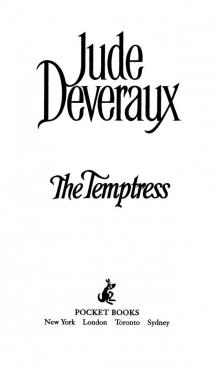 The Temptress
The Temptress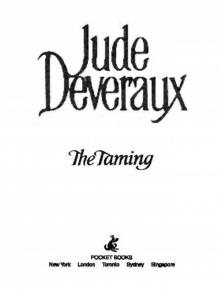 The Taming
The Taming True Love
True Love Forever...
Forever... Lavender Morning
Lavender Morning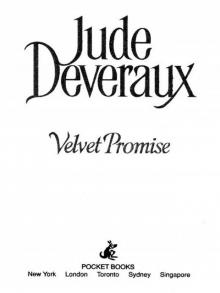 The Velvet Promise
The Velvet Promise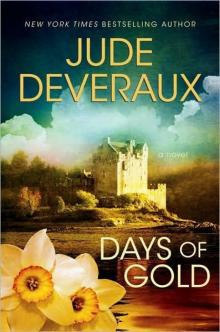 Days of Gold
Days of Gold Temptation
Temptation Counterfeit Lady
Counterfeit Lady Twin of Fire
Twin of Fire Remembrance
Remembrance Velvet Angel
Velvet Angel The Enchanted Land
The Enchanted Land Just Curious
Just Curious Wild Orchids
Wild Orchids First Impressions
First Impressions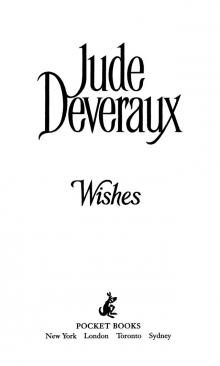 Wishes
Wishes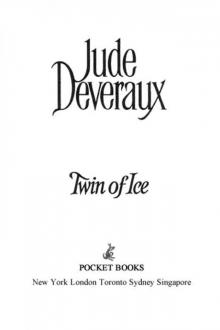 Twin of Ice
Twin of Ice Ever After
Ever After An Angel for Emily
An Angel for Emily River Lady
River Lady The Invitation
The Invitation Scarlet Nights
Scarlet Nights The Black Lyon
The Black Lyon High Tide
High Tide The Girl From Summer Hill
The Girl From Summer Hill Sweetbriar
Sweetbriar As You Wish
As You Wish For All Time
For All Time Secrets
Secrets The Blessing
The Blessing Upon a Midnight Clear
Upon a Midnight Clear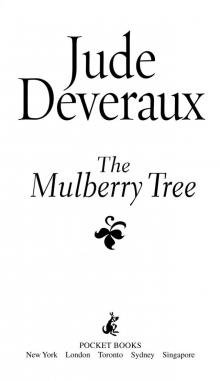 The Mulberry Tree
The Mulberry Tree The Scent of Jasmine
The Scent of Jasmine Sweet Liar
Sweet Liar Carolina Isle
Carolina Isle Holly
Holly A Knight in Shining Armor
A Knight in Shining Armor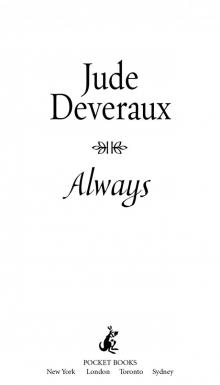 Always
Always The Duchess
The Duchess Forever and Always
Forever and Always The Raider
The Raider The Conquest
The Conquest Moonlight in the Morning
Moonlight in the Morning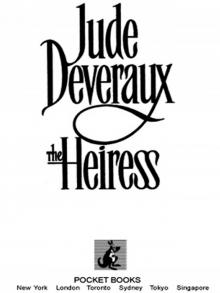 The Heiress
The Heiress Stranger in the Moonlight
Stranger in the Moonlight Moonlight Masquerade
Moonlight Masquerade Change of Heart
Change of Heart The Awakening
The Awakening Velvet Song
Velvet Song Someone to Love
Someone to Love The Summerhouse
The Summerhouse The Princess
The Princess Highland Velvet
Highland Velvet A Forgotten Murder
A Forgotten Murder Lost Lady
Lost Lady Met Her Match
Met Her Match LEGEND
LEGEND Forever: A Novel of Good and Evil, Love and Hope
Forever: A Novel of Good and Evil, Love and Hope Scarlet Nights: An Edilean Novel
Scarlet Nights: An Edilean Novel